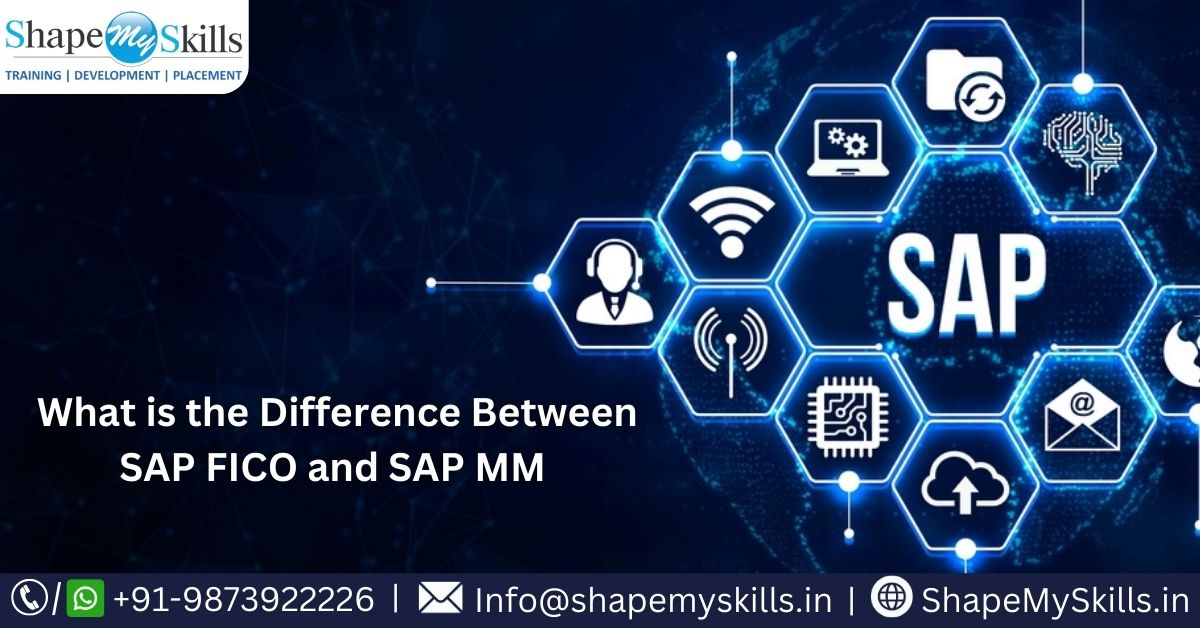Can Machines Really Make Predictions? Magic of Machine Learning
…

SAP, a leading enterprise resource planning (ERP) software provider, offers a wide range of modules designed to streamline business processes. Two prominent modules within the SAP ecosystem are SAP FICO (Financial Accounting and Controlling) and SAP MM (Materials Management). While both modules are integral to managing an organization’s operations, they serve distinct purposes. If you’re seeking to specialize in SAP FICO and unlock its potential, explore our premium SAP FICO Training in Noida.
In this blog post, we will explore the differences between SAP FICO and SAP MM, shedding light on their functionalities, scope, and areas of focus.
There are various factors that differentiate SAP FICO from SAP MM. These differences are based on-
SAP FICO: The SAP FICO module is a comprehensive solution for financial accounting and management accounting processes in an organization. It encompasses a range of functionalities including general ledger accounting, which manages financial transactions and maintains the chart of accounts. Accounts receivable and payable modules handle invoicing, payments, and vendor management. Asset accounting oversees the management and depreciation of fixed assets. Cost element accounting tracks costs and revenues associated with business activities. Cost center accounting allocates costs to different departments or business units. Lastly, profitability analysis provides insights into the profitability of products, customers, and business segments. Together, these features enable efficient financial management and reporting within an organization.
SAP MM: SAP MM is a module that specializes in materials management within an organization. It facilitates procurement processes by managing purchase requisitions, purchase orders, and vendor management. The module also handles inventory management, enabling organizations to track stock levels, perform stock valuation, and manage material movements. SAP MM includes features for vendor evaluation, allowing businesses to assess and rate their suppliers based on performance criteria. Lastly, it enables seamless goods receipt and issue processes, ensuring accurate tracking of material movement throughout the supply chain. Together, these functionalities contribute to efficient materials management and procurement operations.
SAP FICO: SAP FICO is a critical module for organizations of all sizes and industries. It ensures accurate financial reporting, supporting internal and external auditing requirements. The module aids in meeting regulatory compliance standards, such as GAAP or IFRS. Moreover, it provides valuable financial insights and analysis, empowering organizations to make informed decisions and plan strategically for their financial future.
SAP MM: SAP MM is particularly relevant for organizations that deal with procurement, manufacturing, or any form of material management. It is commonly used in industries such as manufacturing, retail, logistics, and distribution. SAP MM streamlines the procurement process, ensuring timely availability of materials, optimal stock levels, and cost-effective sourcing. To gain a comprehensive understanding of SAP MM applications in-depth from anywhere in the world, enroll in the SAP MM Training in Noida .
SAP FICO: SAP FICO offers robust integration capabilities with other SAP modules, enhancing its functionality and enabling cross-functional operations. Integration with SAP Sales and Distribution (SD) module ensures smooth transfer of revenue and billing data, providing a holistic view of financial transactions. Integration with SAP Material Management (MM) allows for accurate material valuation and cost tracking, ensuring precise financial reporting. SAP FICO also integrates with SAP Controlling (CO) module, enabling comprehensive cost accounting and analysis for better decision-making. The seamless flow of data across these modules enables organizations to generate comprehensive reports and gain valuable insights into their financial and operational performance.
SAP MM: Similarly, SAP MM integrates with various other SAP modules to enable end-to-end procurement and inventory management. It integrates with SAP Sales and Distribution (SD) for order processing, SAP Production Planning (PP) for material requirements planning, and SAP Warehouse Management (WM) for efficient inventory management. For better understanding of these integrations and interdependencies, enroll in the Best SAP MM Training. This integration ensures a smooth flow of information throughout the supply chain, from procurement to production and delivery. The question might arise “Why you should choose the SAP MM as your career”.
SAP FICO: The SAP FICO module is typically used by finance professionals, accountants, financial analysts, and controllers. Engaging in Top SAP FICO Training program allows individuals to gain a better proficiency of how these latest technology is being used in organisation .Users of SAP FICO are responsible for managing financial data, conducting financial analysis, generating financial reports, and ensuring compliance with accounting standards and regulations. They utilize SAP FICO to perform tasks such as journal entries, accounts reconciliation, financial planning, and budgeting.
SAP MM: It is a crucial tool for procurement professionals, inventory managers, and supply chain specialists. These users leverage SAP MM to efficiently create and manage purchase orders, ensuring timely procurement of goods and services. They utilize the module to establish and maintain vendor relationships, facilitating effective communication and negotiation. SAP MM helps monitor stock levels, enabling users to optimize inventory management and avoid stockouts or excess inventory. It supports material valuation processes, ensuring accurate tracking of costs and values associated with purchased materials. Ultimately, SAP MM empowers users to streamline the procurement cycle, track goods movement, and optimize inventory across multiple locations.
Understand these differences in-depth, clear these concepts through SAP FICO Online Training and SAP MM Online Training .
While both SAP FICO and SAP MM are integral components of the SAP ERP system, they serve different purposes and cater to distinct areas of an organization’s operations. SAP FICO focuses on financial accounting and management accounting, providing tools for financial reporting, analysis, and decision-making. SAP MM, on the other hand, deals with materials management, streamlining procurement processes, optimizing inventory levels, and ensuring smooth supply chain operations. Now the question arises “Is SAP FICO a good career option in the future”. Understanding the differences between these modules is essential for organizations to leverage their functionalities effectively and enhance their overall business processes.
